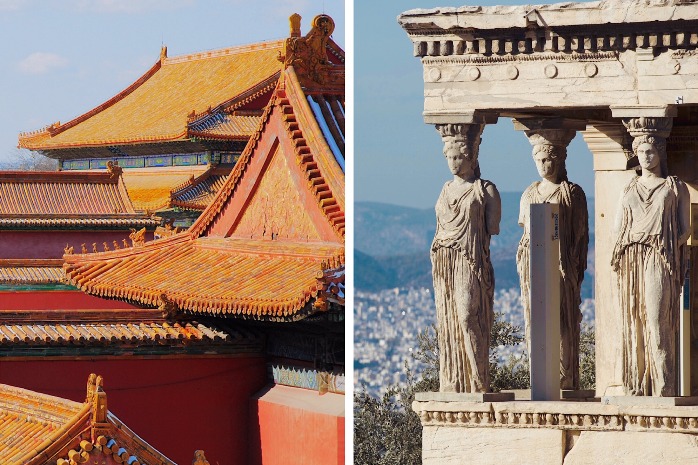How a scholar is bringing China and Greece closer
By ZHOU JIN | chinadaily.com.cn | Updated: 2019-12-02 12:39

When Vasilis Trigkas happened to read an article examining Chinese classic concepts in international relations by Tsinghua professor Yan Xuetong in 2012, the 33-year-old Greek decided to fly thousands of miles to study in Beijing to understand another ancient civilization of the world.
Now, an Onassis scholar of Greece and research fellow in the Belt and Road Strategy Centre at Tsinghua University, Trigkas is pursuing doctoral degree.
His research led him to find extraordinary similarities between the Greek interstate system of the 5th century BCE and the Chinese Warring States Period system.
"Both were systems of Warring States Period but even though they had different cultures, their strategic concepts, their political philosophies converged to a great degree," he said.
In 2013, Trigkas set up a student association in Tsinghua to comparatively examine the accomplishments of classical civilizations. He organizes lectures and discussions on classical texts from China, Greece, India and other "axial" civilizations, as well as language trainings.
"China and Greece are endowed by their philosophical traditions with unique symbols and a humanistic worldview," he said.
With the association as a stepping stone, the scholar then supported an initiative for people-to-people research exchanges between China and Greece as a well as the expansion of the study of Greece in Tsinghua.
"I think Greece and China need to think big and take their research exchanges into an all new level."
Bilateral exchange between the two peoples was also emphasized during President Xi Jinping's visit to Greece earlier this month. In a signed article published in Greek newspaper, the president called for expanding people-to-people exchanges to draw further strength from time-honored civilizations of both countries to make them a model of dialogue between civilizations.
China and Greece have learned from each other through cultural exchanges and shown to the world the harmony of two great and celebrated civilizations, and the growth of China-Greece relations is testimony that ancient civilizations are capable of dynamic, mutually beneficial cooperation in modern times, according to the article.
During his stay in China, Trigkas has visited many cities such as Shanghai, Shenzhen, Chengdu and Zibo.
Among his dozens of trips, the experience in Qufu, Shandong province, impressed him most.
Trigkas has twice visited Qufu, hometown of renowned philosopher and writer Confucius. In one trip, he wore traditional Chinese costumes and attended a series of activities to experience Confucian tradition such as writing Chinese calligraphy to copy quotes from the Confucian classics and tried the ancient Chinese game of touhu--throwing arrows into wine pitchers.
Calling his trips to Qufu "most inspiring", he said they reminded him of the apothegm saying that all Western political philosophy has been a series of footnotes to Plato, similarly all Eastern political philosophy has been a series of footnotes to Confucius.
The doctoral candidate said his research interests are not just about ancient Chinese philosophy, but also China's foreign policy and global economic statecraft, as it is a way to understand the reasons behind China's fast changing development and the country's exchanges with other countries in the international arena.
"In just 40 years China has transitioned from a rural pastoral society into an urban industrial society and this shift is obvious in its bustling megacities," Trigkas said.
He feels deeply about the country's urbanization as well as industrialization. "When I left Beijing for New York City back in 2016, cash was king, and when I returned in 2018, China had almost gone cashless," he said.
Trigkas then called on his own county to apply such a cashless revolution, which he said would offer a great model for Greece as the nation is trying to expand its public revenues.
He also called on China to take further steps for openness and cosmopolitanism to attract more global talent to deal to promote the country's innovation.
"Greece has been a genuine friend of China," he said, adding that the next step would be for China and Greece to work on joint innovation projects as the technological modernization in China brings opportunities.
As a big fan of Chinese tech company Xiaomi, Trigkas said he hopes the company, as well as more Chinese tech firms, could utilize Greece as a stepping stone for expansion in the South and Eastern European market as his home county has impeccable talent for information and communication technology.
























